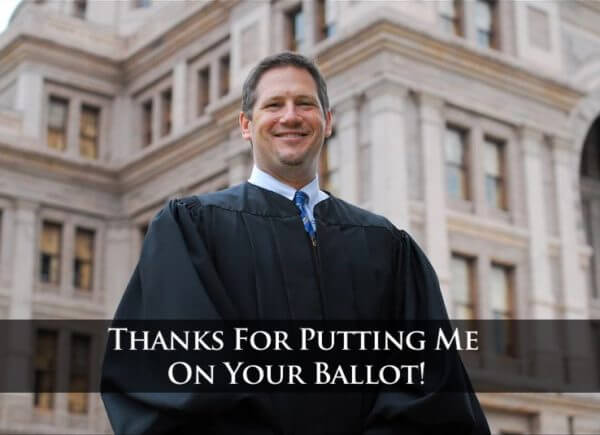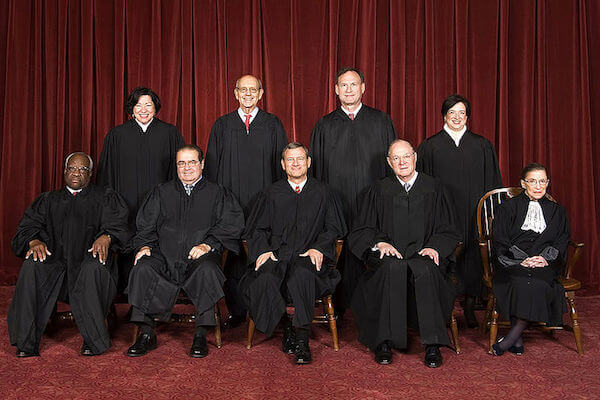Former Defense Secretary Ash Carter, with former President Barack Obama, announced that transgender service members could serve openly, a policy that Donald Trump is threatening to overturn and the GLBTQ Legal Advocates & Defenders and the National Center for Lesbian Rights are fighting to preserve. | PETE SOUZA/ THE WHITE HOUSE
LGBTQ legal groups last week went on the offensive, filing important new lawsuits seeking injunctions against government discrimination.
GLBTQ Legal Advocates & Defenders (GLAD) and the National Center for Lesbian Rights (NCLR) sued Donald Trump and Defense Department officials on August 9, attempting to put a halt to the president’s attempt to ban open military service by transgender people.
The following day, Lambda Legal sued the City of Houston, seeking to vindicate the same-sex marriage rights of city employees, who are mired in state court litigation about whether their spouses are entitled to equal benefits.
Lambda, GLAD, NCLR step in to forestall transgender ban, stop Texas marriage sabotage
The GLAD/ NCLR suit, titled Doe v. Trump, is a gutsy move to try to nip in the bud any implementation of Trump’s July 26 Twitter storm declaring that “the United States Government will not accept or allow transgender individuals to serve in any capacity in the U.S. Military.”
The president’s announcement caught the Pentagon and much of the White House staff by surprise, and appears to have been precipitated by political considerations rather than any real problems posed by transgender people serving in the military. House Republicans threatened to hold hostage a defense appropriations measure unless it was amended to prohibit spending money on gender transition health care for military personnel. Though the House had rejected the amendment, with a significant number of Republicans crossing the aisle to join with Democrats on the issue, news reports indicate Trump was somehow persuaded that any such political obstacle would be solved if there were no transgender people serving.
Until July 2016, a military regulation barred transgender service purportedly on medical grounds, but after a lengthy period of study by Pentagon leaders in the Obama administration, the ban was lifted. The Defense Department adopted a written policy allowing transgender service members to come out openly and extending coverage for transition-related health care to them, following a study concluding the costs would not be excessive and that allowing members to transition would not impair military readiness. Relying on the new policy, several thousand trans service members came out and are now at risk of discharge if Trump’s tweets become policy.
When then-Secretary of Defense Ash Carter announced the lifting of the ban last June, he delayed opening up enlistment of new transgender service members for a year to allow regulations and procedures to be put in place. On the eve of that deadline, Trump’s defense secretary, James Mattis, announced he was extending it to the end of this year. The president’s tweets followed several weeks later.
For days prior to GLAD and NCLR filing their suit, press reports indicated that the White House counsel had signed off on a written guidance to the Pentagon detailing how Trump’s policy was to be implemented. The document itself has not leaked, but sources who claimed to be familiar with it said that rank and file members would not be allowed to re-enlist when their current terms of service expire and would be encouraged to resign earlier. Officers would be dismissed when they came up for promotion. Enlistment of transgender individuals would be prohibited, and transgender-specific health care would not be covered by the military
As of August 9, this guidance had not yet been submitted to the Pentagon, and Defense Department officials, from the secretary down to the service branch chiefs, indicated that nothing would be done to implement Trump’s announcement until a guidance was in hand. There were even some hints of resistance against Trump’s policy shift by military leaders.
The plaintiffs are five transgender members of the military who stand to lose their careers and health care coverage if Trump’s idea is put into effect. They range from relatively recent recruits to long-term members with distinguished service records. They all identified themselves to their commanding officers as transgender after the 2016 policy implementation, and several sought to initiate transitional treatment. One, a member of the Air Force, needs only two more years of service to qualify for a 20-year military pension and fears the policy change would result in her discharge short of this goal.
Trump’s tweets sought to justify his action by stating, “Our military must be focused on decisive and overwhelming victory and cannot be burdened with the tremendous medical costs and disruption that transgender in the military would entail.” The White House released no documentation that transgender service actually involves “tremendous” medical costs and causes “disruption,” because there is no such evidence. A Rand Corporation study commissioned as part of former Defense Secretary Carter’s review of the issue concluded that additional medical costs would be minor in the context of overall military health care expenditures and that disruption was not a significant issue. Several thousand transgender members have served openly for more than a year without causing significant costs or disruption.
The lawsuit proceeds on three legal theories, the first alleging a violation of the federal government’s obligation of equal protection of the laws. “The categorical exclusion of transgender people from military service lacks a rational basis, is arbitrary, and cannot be justified by sufficient federal interests,” the complaint states.
The complaint also alleges a violation of due process of law, asserting that the 2016 policy, together with the plaintiffs’ reliance on it in notifying their superiors about their transgender status, “created a protected interest in Plaintiffs’ ability to continue serving in the military as openly transgender service members.” The due process argument also relies on the contention that a categorical exclusion of all transgender people, regardless of their individual qualifications and service records, “is arbitrary and capricious and lacks any rational basis,” and “impermissibly burdens the Plaintiffs’ fundamental rights to autonomy and privacy.”
Finally, the complaint also relies on what is called the equitable theory of estoppel, a court-created doctrine that protects a plaintiff’s reasonable reliance on the statements of the defendant. Here, the Defense Department told transgender people that they could serve openly “subject to the same rights, responsibilities, benefits, and opportunities as other service members.” Relying on that, many service members came out to their superiors and, in some cases, applied for transition-related health care coverage. “Plaintiffs have served honorably and successfully in the military since coming out as transgender, and their transgender status has not had any detrimental effect on their ability to serve or to fulfill their duties,” the complaint states, so they are entitled to protection from adverse consequences.
The estoppel argument can have considerable weight. A quarter century ago, the Ninth Circuit Court of Appeals used it in ruling against the Army’s refusal to allow Perry Watkins to re-enlist. Watkins was an openly gay man who had enlisted during the Vietnam War and made a career in the Army, both as a valued supply officer and a celebrated drag performer! Though known to be gay, he was highly esteemed by his superiors and allowed to reenlist several times, until a new commander insisted on applying the anti-gay regulations and denying him further enlistment, at a time when he needed one more term of service to qualify for his pension. Having allowed Watkins to serve while knowing he was gay, the Army could not turn around and cut him off just shy of qualifying for his pension, the appeals court ruled. At that point, the Army reached a financial settlement with Watkins, who got his pension without being reinstated.
The complaint challenges the “rationality” of the proposed change in policy because, even though some federal courts have recognized that gender identity discrimination is entitled to “heightened scrutiny” under due process and equal protection theories, the Supreme Court has not ruled on the question. This case was filed in the US District Court for the District of Columbia, within a circuit that does not have an appellate precedent on the issue of heightened scrutiny. The attorneys here are prepared to argue that even applying the most deferential level of judicial scrutiny — that a law or policy has a “rational” basis — the proposed Trump change is unconstitutional.
Their preparedness on this point makes particular sense given the significant deference federal courts have traditionally given the Defense Department on personnel policy matters. That deference stymied opponents of Don’t Ask, Don’t Tell in the years prior to its repeal.
There is a good argument to be made that because the policy decision was dictated unilaterally by Trump, without any real consultation with military experts, and appears to have been motivated entirely by political concerns, it is not entitled to any deference by the courts and should be subjected to heightened scrutiny because of the serious equal protection and due process issues it raises.
The government will likely argue that this lawsuit is premature given that no change in policy has been implemented. That would require, of course, a concession that Trump’s tweets do not constitute official government policy. Any admission that the policy is going to be implemented would undercut the government’s argument that the lawsuit is premature. And plaintiffs could argue that the potential for the policy imposes emotional and psychological burdens and is already disrupting their military careers and, in some cases, their gender transitions.
Volunteer lawyers from Foley Hoag LLP, in Boston, and Wilmer Cutler Pickering Hale & Dorr LLP, with offices in Boston, New York, and Washington, have joined with GLAD and NCLR on this complaint.
A 2014 campaign ad for Texas Supreme Court Justice Jeffrey S. Boyd, who wrote the astonishing opinion from June 30 asserting that the 2015 US Supreme Court ruling did not necessarily settle the question of whether same-sex spouses of Houston municipal workers deserve the same benefits as different-sex spouses. | JUSTICEJEFFBOYD.ORG
Lambda’s Houston case was prompted by a politically-charged June decision from the Texas Supreme Court to defy the US Supreme Court and revive litigation by two taxpayers there who are anti-gay activists contending that Texas law prevents the city of Houston from providing benefits to the same-sex spouses of its employees. The Texas court’s defiance took the form of intentionally misconstruing two US Supreme Court decisions, the 2015 Obergefell marriage equality ruling and the Pavan decision this year, regarding birth certificates in Arkansas.
In Obergefell, the high court found that same-sex couples have a federal constitutional right to marry and to have their marriages recognized by the states. The ruling made clear that same-sex marriages are to be treated under the law the same as all other marriages. This point was reiterated in Pavan, where the court rejected Arkansas’ refusal to treat same-sex spouses the same as different-sex spouses when listing the parents on a birth certificate of a child born to a married woman. In Pavan, the court made clear, if further clarification were needed, that under Obergefell same-sex couples are entitled to all the rights and benefits of marriage, without exception.
The Houston litigation arose after the Supreme Court’s 2013 Windsor decision, which struck down the Defense of Marriage Act provision barring the federal government from recognizing same-sex marriages legal under state law on due process and equal protection grounds. That decision led Mayor Annise Parker to ask the city attorney for an opinion about whether Houston was required by the US Constitution to recognize same-sex marriages of its employees contracted in other states. Based on the attorney’s affirmative response, Parker administratively extended benefits to city employees’ same-sex spouses.
At that point, Houston residents Jack Pidgeon and Larry Hicks, asserting taxpayer standing, ran into state court and won a preliminary injunction against the benefits policy from a trial judge who found their allegation that the mayor’s action violated Texas constitutional and statutory prohibitions plausible. The city appealed to the Texas Court of Appeals, which sat on the case while a lawsuit challenging the Texas marriage ban, DeLeon v. Perry, played out. The US district judge in that case ruled in favor of the same-sex marriage plaintiffs, and the state appealed to the Houston-based Fifth Circuit Court of Appeals.
When the US Supreme Court handed down the Obergefell ruling in June 2015, the Fifth Circuit issued a brief decision affirming the district court on the unconstitutionality of Texas’ marriage ban. In turn, the Texas Court of Appeals reversed the Houston trial court’s decision and sent the case back for disposition “consistent” with the Fifth Circuit’s DeLeon ruling.
Pidgeon and Hicks appealed that ruling to the Texas Supreme Court, which initially denied review. However, the state’s leading Republican elected officials — including the governor, the lieutenant governor, and the attorney general — and local conservative anti-gay forces mounted a strident campaign to persuade the Texas Supreme Court, an elected body made up entirely of Republican judges, to change its mind.
Amazingly, the court did just that on June 30, asserting, quite implausibly, that the question whether Houston was obligated to extend benefits to same-sex spouses of its employees was not necessarily decided by Obergefell and Pavan.
The ruling also exhibited the running tension between state and federal courts over interpreting the US Constitution. Technically, the only federal court whose interpretation of the US Constitution is binding on state courts is the Supreme Court. The Texas Supreme Court, in its disingenuous ruling, said that the Texas Court of Appeals should not have treated the Fifth Circuit’s DeLeon decision as a binding precedent, but merely as a possibly persuasive one. Since Texas never appealed the DeLeon decision to the US Supreme Court, it was argued, that court has never declared the Texas marriage ban unconstitutional.
This conclusion is clearly inconsistent with the Pavan decision, which involved another state, Arkansas, that was also not directly involved in the Obergefell case. The Pavan ruling makes clear that the US Supreme Court’s interpretation of the federal Constitution is binding on all states, not just those that were directly involved in the case decided. When the Supreme Court interprets the Constitution, it is stating a uniform rule for the country. When the Supreme Court says that same-sex couples are entitled to the “full spectrum” of marital rights, that means everywhere in the US.
As a result, contrary to the Texas Supreme Court’s finding, there should be no need for a trial court in Houston to continue considering whether the same-sex spouses of municipal workers qualify for benefits.
The new lawsuit filed by Lambda on August 10 aims to short-circuit the process and get a quick declaration from the federal district court that any effort to treat the same-sex marriages of Houston employees differently from different-sex marriages violates the 14th Amendment, as clearly indicated by Obergefell, Pavan, and DeLeon. A federal court order to the city would take priority over anything the state courts might do.
Lambda represents three couples, each of whom is entitled to spousal benefits coverage. Noel Freeman, a division manager in the city’s Public Works and Engineering Department, married William Bradley Pritchett in Washington, DC, in 2010. Pritchett has health care coverage from his own employer, but relies on the city for vision coverage.
Yadira Estrada, a Houston Police Department sergeant, married Jennifer Flores in Florida in 2013. Flores’ employer provides insurance, but it is more expensive and the coverage is less extensive than under the city’s benefits policy, which she relies on as they start a family.
Ronald Reeser, a central network administrator for the city, married Vincent Oliver in Vancouver in 2008. Like Flores, Oliver works for a company that provides benefits, but the plan is more expensive and less extensive than city coverage.
All three of the city employee plaintiffs enrolled their spouses for benefits shortly after Mayor Parker announced the new policy in 2013, so all clearly have legal standing to pursue their claims.
Lambda’s legal theory is straightforward. Under Obergefell and Pavan, the city is obligated to treat the same-sex spouses of its employees the same as opposite-sex spouses when it comes to providing employee benefits. The city cannot rely on the Texas marriage amendment or statutory bans on same-sex marriage because they are clearly unconstitutional under Obergefell.
“The City can offer no important or compelling governmental interest as a public employer that would sufficiently justify providing different compensation packages to similarly situated, married employees solely because of the sex or sexual orientation of the employee,” the complaint reads. “Nor could the City justify demeaning and stigmatizing same-sex employees and spouses by denying them equal recognition of their marriages and access to family protection and benefits.”
Lambda Legal is joined by volunteer attorneys from the Houston and Washington offices of Morgan Lewis & Bockius, LLP, in representing the plaintiffs.





































